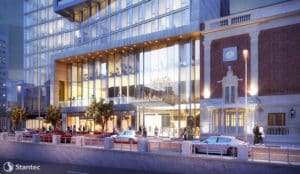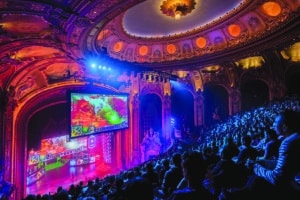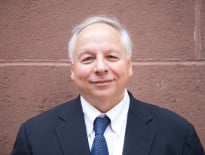While commercial developers move forward with large indoor concert halls in the Fenway and North Station, a study has concluded that prospects for enhancing Boston’s community arts venues are growing dimmer.
The city’s development boom has displaced arts groups from rehearsal and performance spaces, and prospects for new facilities are hamstrung by uncertain financial models, according to a year-long study. Boston-based consultants Technical Development Corp. (TDC) surveyed 190 artists and organizations and 45 space providers.
At the top of groups’ wish lists are rehearsal spaces of all sizes, and performance venues with up to 1,800 seats. Many groups want to develop their own facilities but lack the resources to fundraise the cost of construction and operations.
The final report suggests the city consider changes to operation of the municipally-owned Strand Theatre in Dorchester and Boston Center for the Arts to meet the needs of more groups. It also recommends new funding sources through public-private partnerships and charitable and developing new funding sources from foundations, while acknowledging that past efforts have had limited success.
“There is widespread weariness and doubt that solutions can happen,” the report said. “We heard clearly from participants that this discussion and attempts to find solutions have occurred many times before, yet transformative action has not been taken to remedy the situation.”
A Seaport Commitment, But Uncertain Timelines
The 7.6-million-square-foot Seaport Square development offers a “once-in-a-generation opportunity” to add to the city’s inventory of performing arts space, but uncertainty about the timing of those projects lingers.
Original approvals in 2010 included a 200,000-square-foot performing arts facility. But Newton-based WS Development, which is building out the remaining 12.5 acres after acquiring them from Boston Global Investors in 2015, said a single, large complex doesn’t provide the flexibility to meet the needs of the local arts community. That view was supported by many of the respondents interviewed during the TDC study.
The Boston Planning and Development Agency last year amended the Seaport Square approvals to eliminate the 200,000-square-foot theater. In its place, the plans call for a 600-seat Seaport Performing Arts Center (SeaPAC) and a 150-seat black box theater.
WS is required to build the black box theater as it completes development of the four Block L parcels but plans for only one parcel have been submitted so far: the 525,000-square-foot office building that will be anchored by Amazon. BPDA documents identify Block P, located south of Summer Street, as “most likely” the location for SeaPAC. No plans have yet been filed for development of that parcel.

The future home of the Huntington Theatre.
Huntington Offers Possible Model
The scaled-down requirements didn’t sit well with some arts organizations, including the Boston Lyric Opera Co., which has been searching for a permanent home with capacity for 1,500 patrons. The BLO ended its association with the Schubert Theatre in 2016 and has been splitting its performance schedule among four different facilities in Boston and Cambridge. But the organization remains committed to finding a permanent home.
“I’m optimistic, but it will take a coalition of visionaries and civic leaders to make it a reality,” BLO General and Artistic Director Esther Nelson said in a statement this week.
The TDC report points to partnerships such as The Huntington Theatre Co.’s renovation of its South End facility as one model that could benefit other groups. In a compromise brokered by city hall, Boston University sold the 870-seat playhouse to private developers who received approvals for a 362-foot-tall apartment tower next door. The development group donated the playhouse property to the theater group and leased it 14,000 square feet of space in the tower for conference and performance space, a café and ticket booth.
Prospects for development of large-scale commercial concert halls in Boston appear to be improving, even as many smaller nightclubs give way to redevelopment as housing. A 40,000-square-foot concert hall called Big Night Live is scheduled to open in fall 2019 at The Hub on Causeway in a partnership between Live Nation and Big Night Entertainment Group. The owners of Charlestown’s Hood Park last year floated plans to build a 4,000-seat concert hall before dropping it because of neighborhood opposition.
Live Nation is simultaneously partnering with the Boston Red Sox on plans for a 5,000-capacity Fenway Theater on land owned by the ballclub between Lansdowne and Ipswich streets. No formal plans have been submitted to the city.






